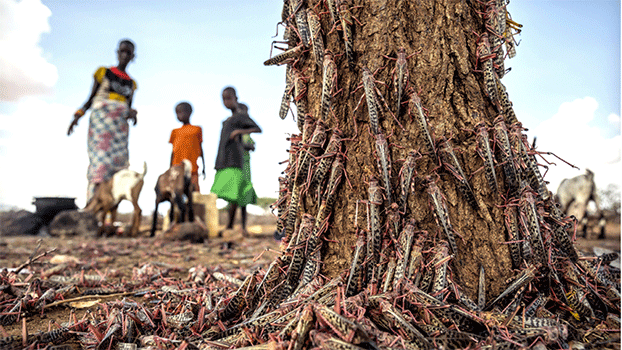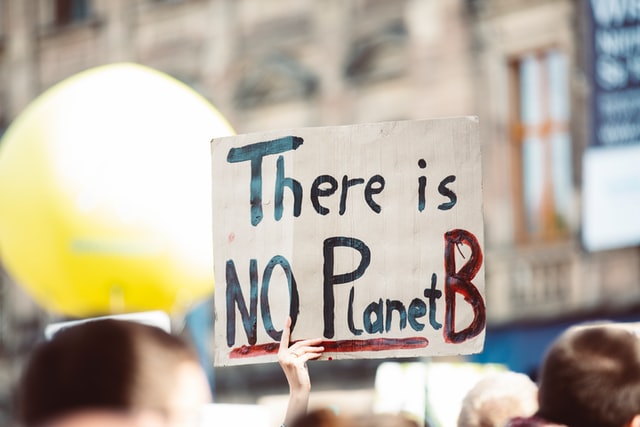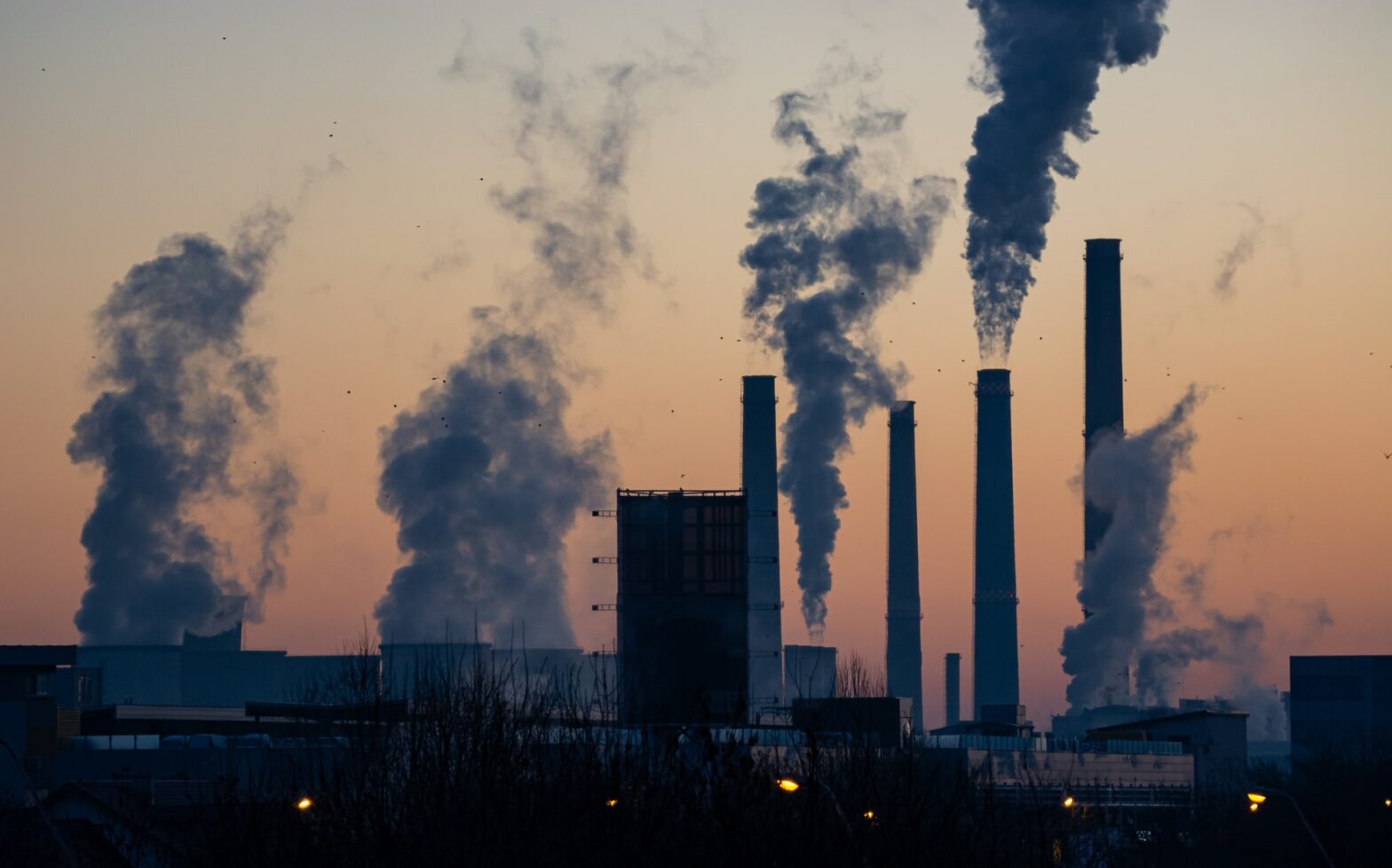Partager Twitter Facebook Email Copy URL
So far, too little attention has been paid to how the climate crisis is already bringing about migration and displacement worldwide

In this photo taken Tuesday, March 31, 2020, desert locusts swarm over a tree in Kipsing, near Oldonyiro, in Isiolo county, Kenya. Weeks before the coronavirus spread through much of the world, parts of Africa were already threatened by another kind of plague, the biggest locust outbreak some countries had seen in 70 years, and now the second wave of the voracious insects, some 20 times the size of the first, is arriving.
Sven Torfinn/FAO via picture alliance / AP Photo
Nadja Charaby is a head of the RLS International Politics and North America Unit and a senior advisor for Climate Policy at the Rosa-Luxemburg-Stiftung in Berlin.
The reports of the past few weeks could not be more contradictory. The “Sophia” naval mission, which saved around 50,000 people between 2015 and 2019, has been definitively buried by the European Union. In its place, the EU is now relying on border security in Libya and a barely enforceable arms embargo, while the rescue of thousands of refugees from drowning has been left to private, volunteer sea rescue services.
At the same time, the UN Human Rights Committee ruled at the end of January 2020 that the international community would not be able to deny to people affected by climate change the right of asylum in the future. And yet this global community, itself partly engendered by the almost total absence of an international climate policy, stands idly by while East Africa is beset by a massive plague of locusts that has probably not yet reached its peak. One contributing factor to the locust plague has been the rising temperatures in the Indian Ocean resulting from climate change and the extreme rainfall associated with this. The risk of renewed famine is increasing, which in turn raises the risk of conflict, displacement, and migration in a region that is already massively affected by climate change. In the past year alone, for example, around one million people fled due to natural disasters in Ethiopia and Somalia. Of the 17.2 million people displaced within their home country due to natural disasters and extreme weather events in 2018, the Philippines, China, and India jointly hold the unenviable record with almost ten million displaced people.
Yet it is no longer just the poor regions of the world where climate crisis and displacement go hand in hand. In the United States, 1.2 million people had to leave their homes in 2018 due to natural disasters, making it the country with the fourth highest rate globally. The massive destruction caused by the bush fires in Australia is hopefully still in the forefront of our minds. Numerous towns and regions also had to be evacuated there. Even if not every storm is directly attributable to climate change, extreme weather events of this sort have become more frequent in recent decades on account of global warming and the devastating scale of their effects is growing. In turn, the climate crisis is exacerbating existing social injustices. The livelihoods of entire regions are now being destroyed. Many people are falling into the poverty trap. Their chances of ever escaping the crisis are disappearing. So far, far too little attention has been paid to the fact that the climate crisis is already leading to migration and displacement worldwide. This is not a future scenario, but an already bitter reality.
When we point out the connections between climate crisis and migration, critical voices often try to argue that the reasons cannot be clearly pinpointed. Certainly, in many cases there are several reasons, such as drought, hunger, and military conflict. It can never be a question of whether one factor causing people to seek refuge is more important than the other. Instead, the focus must be on how the global community will ensure that the human rights of those affected are protected. In the coming decades, millions or even billions of people will be forced to migrate as a result of the climate crisis, many times more in the Global South than in the Global North. Most affected are those who have contributed the least to climate change. The industrialized nations, including the EU, watch on with institutionalized indifference—the failure to put in place a climate policy is evidence of this. The demand for the reliable protection of the rights of affected countries, regions, communities, and individuals constitutes one of the core demands of climate justice.
Despite a growing scientific grasp on the interfaces between the climate crisis and migration, it remains a challenge to determine exactly who is having to flee their homes as a direct result of climate consequences. For this reason, the data on future global developments differ widely. The current figures predicting how many people will have to migrate in 2050 due to climate crises range between 25 million to 1 billion. Most of them will move within their own countries; very few will be able to flee to Europe or the United States. Awareness of these figures is crucial for the development of international or national policy approaches.
From the perspective of those affected, the most important thing is to protect their rights. Yet so far there have been too few concrete approaches and measures, despite the relationship between the climate crisis and migration having become part of several multilateral processes, such as the “Global Compact for Migration” or the UN Framework Convention on Climate Change. The pioneer ruling by the Human Rights Committee this January clearly states that the right to asylum cannot be denied if people fear for their lives because of climate change. However, there is currently no legally binding convention that protects the rights of climate migrants internationally. An international convention would in any case probably not have helped the numerous internal migrants.
Those affected rightly demand that those responsible for the climate crisis—industrialized countries and fossil fuel companies—pay compensation for the consequences and assume responsibility. In addition to the demand for a “right to freedom of movement”, there is also a demand for a “right to migration with dignity”. This is what is being demanded by the state of Kiribati, which is at risk of total submersion. The residents of Tuvalu, by contrast, are demanding a “right to stay”. Those responsible for the climate crisis must therefore ensure that local populations are not forced to leave their homes. Of central importance is the provision of additional funds for countries from and in which people are displaced or have to be resettled due to climate change. The development of social security systems in countries affected by the climate crisis is becoming even more important, as is the introduction of disaster warning systems and technology transfers.
And what if adaptation to climate change is no longer possible and an entire state, as feared in the case of some Pacific islands, is under threat of disappearing due to climate change? Like the Nansen passports created to give stateless people access to a new nationality after the First World War, climate passports could offer a possible solution here. In this case, it must be the task of industrialized countries to issue appropriate passports: those who caused the situation must be the ones to pay for it.
Even if these ideas sound technocratic, or less enticing than demonstrating for the phasing-out of coal (which remains important), it is crucial that we here in Germany continue to exert political and public pressure on the federal government to move in this direction. As leftists especially, we must also make clear exactly what we mean when we demand that the causes of migration be tackled systematically. It is crucial that we combat the climate crisis at the place where it was generated—namely, at home. And if, subsequent to this, we want to explore all manner of larger transformational models, such as the Green New Deal, then we have to conceive of them internationally, in the interests of climate justice, to ensure that we don’t simply externalize the social and ecological costs of that transformation by dumping them—once again—on the Global South.
Translated by Kate Davison and Wanda Vrasti for Gegensatz Translation Collective



